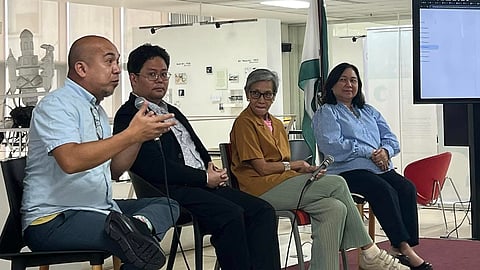
- NEWS
- the EDIT
- COMMENTARY
- BUSINESS
- LIFE
- SHOW
- ACTION
- GLOBAL GOALS
- SNAPS
- DYARYO TIRADA
- MORE

Industry experts strongly encouraged a selection of artists, educators, interior designers, architects, and researchers, to transform their ideas into books at the 2nd edition of the Benilde Writers Workshop on Copyright and Book Publishing.
The initiative was organized by the De La Salle-College of Saint Benilde (DLS-CSB) Center for Intellectual Property Management (CIPM), an Intellectual Property Office of the Philippines (IPOPHIL)-accredited Innovation and Technology Office.
The two-day event is the first step for aspiring book authors, who wish to avail of the Benilde Publishing Grant. It provided participants with a comprehensive understanding of copyright and the publishing process, as well as the specific guidelines and support available.
“The workshop is designed for the attendees to apply the knowledge gained to their own projects, preparing them to successfully navigate the world of book publishing — both in digital and print formats,” DLS-CSB CIPM director Janice Tejano stated.
“They claim print is dead — I don’t think so,” lawyer Andrea Pasion Flores, publisher of Milflores Publishing, stated.
In her lecture, Flores provided the fundamental differences between trade and self-publishing. She walked through the book publishing process, from operations and sales to finance.
Lawyer Nicole Regencia from the Bureau of Copyright and Related Rights introduced the basics of copyrights, the legal protection extended to the authors and creators of literary, artistic, scholarly, or scientific works. She encouraged everyone concerned to register their works through the Intellectual Property Office of the Philippines (IPOPHIL) website not only to possess an official certificate of ownership, but to also maximize the value of their creations.
“It gives its owner the right to prevent others from copying, selling, displaying, performing, or making derivative versions,” she explained. “Users should obtain permission from the author or copyright owner to use these works in exchange for the payment of royalties.”
To highlight the crucial role of artificial intelligence in the ever-evolving creative landscape, Tejano not only expounded how AI-assisted tools can assist the authors in their journey. But she likewise reminded them of the importance of evaluating its legal considerations in intellectual property (IP).
“By the end of the day, the tools are just tools, and we have to use them responsibly,” she concluded.
In terms of translating concepts into contracts, literary agent Anthony John Balisi stressed the importance of understanding the market and drafting a winning book proposal. He provided the attendees with a rate guide, a list of possible publishers, and several tips on how to look for agents, manuscript development and publishing grants, and translation subsidy programs.
“We start with the stories you want to share,” he declared. “We begin with your ideas.”
Michael Ditchella, Instructional Design head of C&E Publishing Inc., highlighted the ethical considerations and dilemmas in the industry. He also reiterated the risks of plagiarism and copyright infringement, and reliance on AI-generated content.
“Do you write for economic or moral reasons? Do you wish to make a mark and contribute to your discipline?” he asked. “If you want to express yourself, give light to a quality product.”
Dr. Lorelei de Viana, author of Walk Manila, an award-winning guidebook to 100 heritage sites and structures in the capital, shared some tips on how to enhance writing skills. Her personal advice: Write about something you are passionate about. She likewise reiterated the importance of research in this endeavor.
“Let your hair down; be one with the people,” she added. “It is an act of humility.”
Publishing essentials, from guidelines to best practices, were covered by Philippine Educational Publishers Association director for Public Relations Gwenn Jessica Galvez, who was also a former manager of the Far Eastern University Bookstore. She shared the practical aspects, from drafting the book plan and authoring to editing and the actual publishing.
“If you have so much to say, break it up. Readers are collectors,” she advised.
“Authoring is not necessarily writing,” she said. “Publication is no longer synonymous with print.”
The workshop culminated with the soft announcement of the first batch of finalists for the Benilde Publishing Grant. Among them were Camille Rose Albarracin, Everything Green Trading consulting founder and Benilde School of Hotel, Restaurant and Institution Management alumna; Jag Garcia, filmmaker and Benilde Film Program educator, and Jeremiah Adriano, Benilde Center for Inclusive Education Inclusion Advocacy head.
